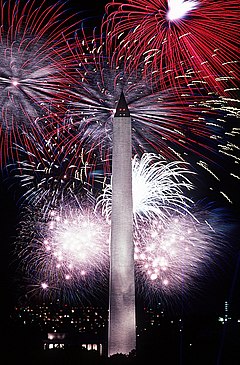| Independence Day | |
|---|---|
 Fireworks displays, such as these over the Washington Monument in 1986, take place annually across the United States on July 4th, known as Independence Day. | |
| Also called | Fourth of July |
| Observed by | United States |
| Type | National day |
| Significance | The day in 1776 that the Declaration of Independence was adopted by the Second Continental Congress in Philadelphia |
| Celebrations | Fireworks, family reunions, concerts, barbecues, picnics, parades, baseball games |
| Date | July 4[a] |
| Frequency | Annual |
Independence Day, known colloquially as the Fourth of July, is a federal holiday in the United States which commemorates the ratification of the Declaration of Independence by the Second Continental Congress on July 4, 1776, establishing the United States of America.
The Founding Father delegates of the Second Continental Congress declared that the Thirteen Colonies were no longer subject (and subordinate) to the monarch of Britain, King George III, and were now united, free, and independent states.[1] The Congress voted to approve independence by passing the Lee Resolution on July 2 and adopted the Declaration of Independence two days later, on July 4.[1]
Independence Day is commonly associated with fireworks, parades, barbecues, carnivals, fairs, picnics, concerts,[2] baseball games, family reunions, political speeches, and ceremonies, in addition to various other public and private events celebrating the history, government, and traditions of the United States. Independence Day is the national day of the United States.[3][4][5]
Cite error: There are <ref group=lower-alpha> tags or {{efn}} templates on this page, but the references will not show without a {{reflist|group=lower-alpha}} template or {{notelist}} template (see the help page).
- ^ a b "What is Independence Day in USA?". Tech Notes. July 2, 2015. Archived from the original on June 22, 2019. Retrieved July 2, 2015.
- ^ Cite error: The named reference
NYT-20220703was invoked but never defined (see the help page). - ^ "National Days of Countries". Ministry of Foreign Affairs and Trade. New Zealand. Archived from the original on September 4, 2011. Retrieved June 28, 2009.
- ^ Central Intelligence Agency. "National Holiday". The World Factbook. Archived from the original on May 13, 2009. Retrieved June 28, 2009.
- ^ "National Holiday of Member States". United Nations. Archived from the original on July 2, 2012. Retrieved June 28, 2009.